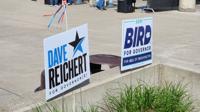(The Center Square) – The Washington State Department of Ecology appears to have removed claims on its website downplaying the impact of the state’s new carbon tax on fuel prices.
That's according to Todd Myers, environmental director at the Washington Policy Center, a free-market think tank.
“Now, as gas prices have increased about 40 cents per gallon compared to Idaho and Oregon since the beginning of the year, Ecology staff have quietly scrubbed the agency’s web page of those claims,” Myers wrote in a Monday blog. “They also significantly increased the estimated impact of the tax on CO2 emissions on Washington’s economy.”
The cap-and-trade program established by the Climate Commitment Act puts limits on greenhouse gas emissions from large polluters. Companies unable to meet the cap can purchase carbon allowances from the state. Similar to stocks and bonds, these allowances can be obtained through quarterly auctions hosted by Ecology.
The first auction was held on Feb. 28 and brought in nearly $300 million. The next auction is set to take place Wednesday.
Per Myers’ blog:
The section that confidently claimed that gas prices wouldn’t increase by 46 cents a gallon and promising “minimal” price impacts in 2023 has been completely removed. Where they previously expressed certainty that minimal cost impacts weren’t “best case” outcomes, they now say nothing.
Under the question, “What are Ecology’s estimates for the impacts on gas prices,” the new text includes only a projection for a different law – the low-carbon fuel standard – but says nothing about the price impact of the CCA.
Additionally, Ecology staff also made a significant change to the wording of another answer on the price impact of the CCA. Where they previously claimed the impact on “gas prices” would be “1% to 3% in 2023” they now say the “overall economic impact of the cap-and-invest program to be 1 to 3%” (italics mine).
Myers then took the department to task for downplaying the carbon tax’s role in increasing gas prices:
How, then, do Ecology staff explain the significant increase in gas prices compared to other states? They have turned to vague distraction. They write, “In 2022, a combination of international and national factors drove fuel prices to record highs — including the invasion of Ukraine, refinery problems, and a slow recovery from the pandemic, which limited oil and gas development. Starting in summer 2022, gas prices began falling. They are now almost $1 per gallon below the 2022 peak. Historically, gas is a volatile commodity — retail prices are affected by changes to production capacity, and supply and demand for crude oil. State regulations play a minor role.”
The Center Square reached out to the Department of Ecology and the Governor's Office for comment.
The Department of Ecology responded.
"The accusations in the Washington Policy Center blog are unserious," Claire Boyte-White with the Department of Ecology's Climate Commitment Act Implementation Group said in an email to The Center Square. "Ecology recently made a number of small updates to a single web page, 'Economic impacts of Washington’s climate policies.' The web page is still there. The content on the page still references both the economic impacts of the Climate Commitment Act and the Clean Fuel Standard. The economic analyses that Ecology commissioned last year are still linked at the very top of the page and publicly accessible."
She continued, "The information on that web page was originally created to counter misinformation in the summer of 2022, while the cap-and-invest and clean fuels programs were in the development phase. Because these are important policies for our state, we thought it was appropriate to keep the information on the website now that both programs are up and running."
"The Washington Policy Center blog asserts that any mention of the price impacts of the Climate Commitment Act has been removed," Boyte-White concluded. "This is incorrect – both policies are still addressed, including in the section on gas price impacts..."
Mike Faulk, Gov. Jay Inslee's spokesperson, also responded.
"We agree with Ecology’s position," he emailed The Center Square. "Thanks."









